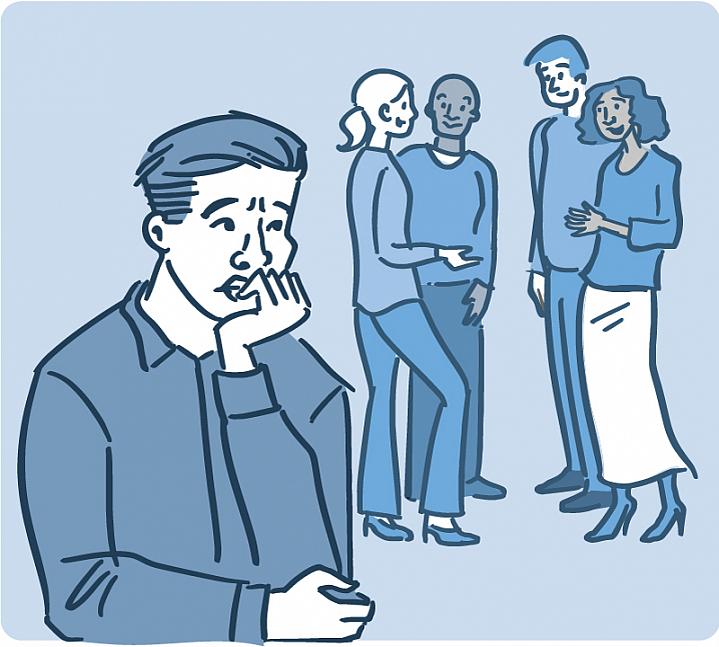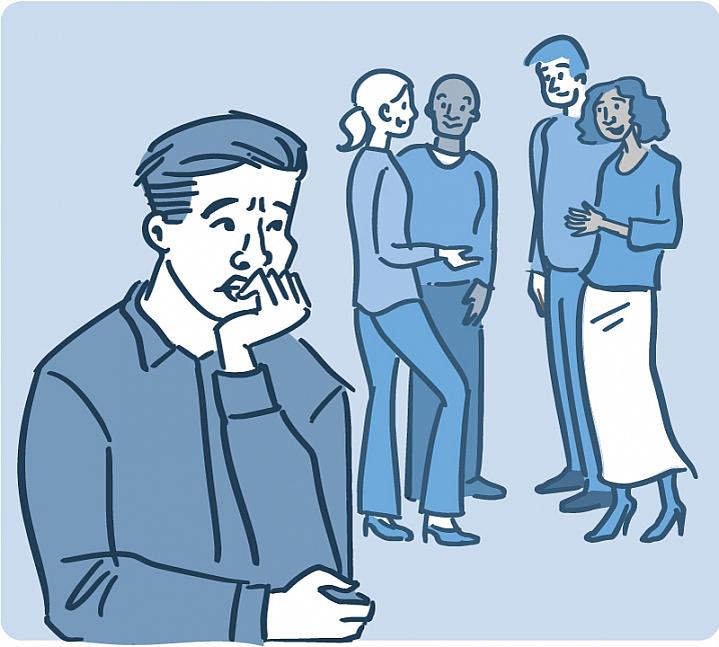Table of Contents
Anxiety is an emotional disorder characterized by a sense of insecurity, tension or uneasiness that one feels face to an nonexistent or undetermined peril. Unable to keep under control the feeling, the patient expresses behavior of nervousness or worry. Although can lead to fear, anxiety is different from fear which responds to a real threatening situation.
Anxiety can be normal or pathological (can cause disease). A normal anxiety is a psychological state that can improve learning and performance. It becomes a disorder when the emotion resulting in an indefinable sense of insecurity. Your mind becomes so deeply preoccupied that you cannot control yourself.
Anxiety is considered abnormal when it responds to at least one of the fallowing characteristics below:
- It occurs without reason
- It becomes a permanent condition;
- It is not related to life events;
- It is the result of a request for love or sympathy;
- It is manifested by panic attacks;
- It is complicated by depression;
- It leads to addiction: addiction to drug, alcohol, etc.
Anxiety Causes and Risk Factors
Scientists do not know the exact causes of anxiety in some people. They believe that several biological, psychological and socio-cultural factors (especially bad experiences of life) are responsible.
Heredity – researchers believe that family factors play a major role in the onset of anxiety attacks. You are more likely to develop anxiety if a member of your family (parent) has suffered from this disease. Anxiety is highly prevalent in families of people with parents or grandparents suffering from the disorder. It is found a large number of people with this mental disorder having parents who are affected by the same condition.
Drugs and Medications – alcohol abuse or certain drugs can cause symptoms of anxiety. The effects of these drugs, including alcohol, can be felt while either you are intoxicated or years after you quit using those harmful substances. Substances most often associated with symptoms of anxiety are stimulants, including caffeine, cocaine and prescription drugs such as methylphenidate.
Diseases – Anxiety is the main symptom of most neurotic disorders: hysteria, fear and obsession. Besides mental issues, the disease may be a sign of organic diseases: heart disease (myocardial infarction), respiratory failure, asthma, hyperthyroidism, etc. Abuse of certain drugs such as amphetamines, barbiturates, anxiolytics, or Corticosteroid hormones) can trigger a state of anxiety.
Lack of Sleep – it may be sound bizarre, but many researches have confirmed that lack of sleep increase the risk of becoming anxious. Getting a good night’s sleep, not only boost your immune system, but also prevent stress and anxiety. Being mentally tired due to lack of sleep can make you more anxious and more apt to develop a variety of mental disorders.
Poor Diet – a poor diet affect you both mentally and physically. So, if you want to be mentally healthy, from now on, decrease unhealthy fats in your diet; avoid or consume moderately fast food, frozen foods, artificial sweeteners, coffee, etc; Increase your omega 3 intakes and drink abundantly fresh natural juice.
Lack of Exercise – Physical inactivity is link to most so-called incurable diseases that ravage our society now days. You do not need to lift heavy weight to exercise. Depending to your health state, walking for about thirty minutes a day at a comfortable pace is enough. Regularity in exercise is also important. Do not start today and stop tomorrow, and then restart next month; that does not help.
Anxiety Warning Signs and Symptoms
 The symptoms of anxiety have three main characters:
The symptoms of anxiety have three main characters:
Presentiment of vague and imminent danger – in this condition, you may feel: headaches, fear of dying, derealisation (feelings of unreality), difficulty concentrating, difficulty of falling asleep or staying asleep (insomnia), concerns and exaggerated tensions, occurrence of unpleasant ideas, inability to relax, fear of losing self-control, etc.
Varied physical reactions – this mental disorder tends to provoke: feeling of suffocation, palpitations, sweating, dry mouth, dizziness, shaking, vomiting, nausea or diarrhea, muscle tension, chest pain or discomfort, etc.
Feeling of helplessness before threats – in this type of disorder, you may feel all the symptoms above, and the following: irritability, dizziness or near-fainting (but barely real), numbness or tingling, etc.
What is the diagnosis of anxiety?
It happens to everyone to feel anxious sometimes; it does not mean you have anxiety disorder. It becomes a problem when the anxiety lasts six months or more and impact on your daily life. Depending on the cause of the anxiety, you can overcome the fear without the help of a professional. In serious conditions, however, it is necessary to have support; you need psychological help from friends or a mental health provider.
In general, the psychologist will ask you questions about things that can cause worries and fears in a way to find out if your problems have a medical origin; some diseases can cause anxiety disorders. In addition, taking certain medications may develop symptoms similar to anxiety: fear, confusion, rapid heartbeat, or nervousness. If the specialist realizes that the problem is linked to medications or a disease, he/she will recommend you to change the drugs or treat the disease in question. In certain circumstances, it is possible that the doctor recommends physical exam and blood tests.
Anxiety Treatment
Two forms of therapies are used to treat anxiety attacks:
1) Cognitive-Behavioral Therapy (CBT): this type of therapy is often very effective in less serious anxiety attacks. In fact, they seem to be effective even in severe anxiety disorders in some people. Its objective is to improve your confidence in a way to help cope with the symptoms of the disease and, eventually, to control them. Relaxation and meditation techniques are also used to help anxious people better control their emotion and breathing.
2) Medication: In case of failure of psychotherapy or along with CBT, taking medicines may be necessary. The medicines used, most of the time, are antidepressants, especially Selective serotonin reuptake inhibitors (SSRIs) such as Effexor and Cymbalta.
Be aware of the side effects of those drugs: loss of appetite, insomnia and tiredness, dry mouth, constipation, abnormal weight loss, sexual problems (impotence), high cholesterol levels, and rapid heartbeat.
Sometimes, your doctor may prescribe you anxiolytics (antianxiety agent). However, some of those drugs such as benzodiazepines should be prescribed with care because of their additive effect.
3) Remember, if your anxiety is due to a problem you are facing of which the solution is beyond your capacity, prayer therapy is the best solution; as long as you believe.



